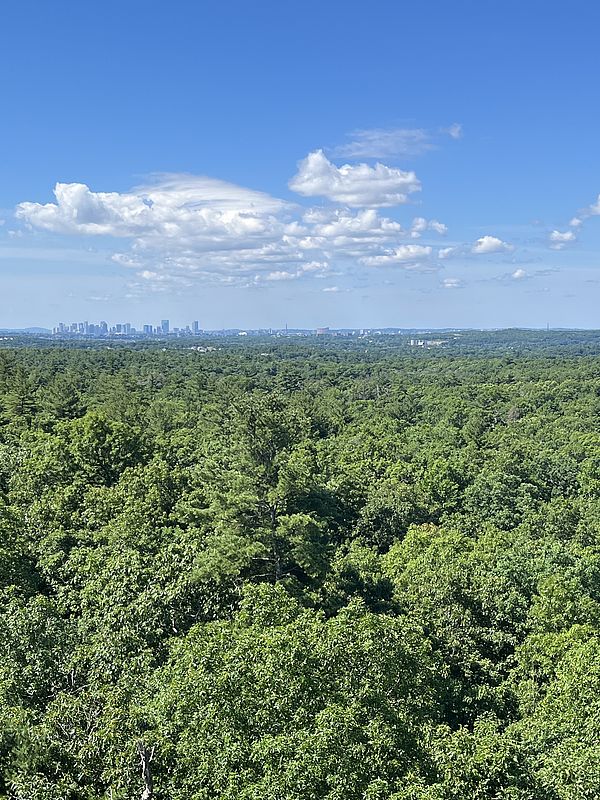Greenbelt, Essex County’s Land Trust, the Massachusetts Department of Conservation & Recreation (DCR), and the City of Lynn are pleased to announce the completion of a decades-long effort to permanently conserve Lynn Woods.
The City of Lynn and Lynn Water & Sewer Commission, owners and managers of the popular park and water supply, granted a Conservation Restriction over Lynn Woods to DCR and Greenbelt on December 28, 2023.
The Conservation Restriction ensures Lynn Woods will be forever protected against any development threat, and will always be available for public enjoyment of its miles of woodland trails and for drinking water supply.
“These 2,100 acres are getting more use than it's ever had in its history,” said Dan Small, Lynn Woods Park Ranger. “We have 40 miles of trails and it used to be in the winter, nobody came here. Now there are always cars in the parking lot.”
Lynn Woods was one of the first – and for a time the largest – municipal parks in the country. In 1870, the then Lynn Water Board, now known as the Lynn Water and Sewer Commission, acquired the land that would become Breed’s Pond following a destructive fire in the city the previous year.
In 1889, Frederick Law Olmsted, the landscape architect behind Boston’s Emerald Necklace, advised the City of Lynn that the site should be left undeveloped and preserved in its natural state for local residents to enjoy.
In 1890, Lynn voters approved the creation of what was then the 998-acre Lynn Woods. The park, which stretches through Lynn, Saugus and Lynnfield, has since grown to the more than 2,100 acres it is today and includes more than 40 miles of trails for hiking, running, skiing, biking, and walking, as well as three drinking water reservoirs.
But the forested landscape that generations believed to be Lynn Woods Reservation was not fully protected. The area including Breeds Pond was once considered for the rerouting of Route 95. A golf course was once proposed for the heart of Lynn Woods. And there was the threat of “death by a thousand cuts:” parcels on the periphery of the park have been nearly developed, as recently as the late 1990s.
The Commonwealth first aided the City in 2001 by acquiring 40.5 acres in Saugus to quash a development threat on the shores of Walden Pond. The Friends of Lynn Woods played a pivotal role in advocating for a permanent end to these threats via a conservation restriction.
“Nearly thirty years ago Jim Comeau [DCR Land Protection Specialist] and I were discussing various development threats within the Lynn Woods watershed, said Steve Babbit, founding member of the Friends of Lynn Woods and current Lynn Parks Commission Chair. “Jim and I agreed that the both of us would not be around forever to fight these threats and he suggested the possibility of a conservation restriction - that’s where this effort was born.”
Comeau reached out to Greenbelt to help with the conservation restriction effort.
“Hiram Marble, of Dungeon Rock fame, way back in 1852, was 100 percent certain that treasure would be found within Lynn Woods,” said Comeau. “Instead of buried pirate booty, the real treasure is found every day in the form of lifetime memories: that long ago sunset walk with a departed friend, hitting the perfect shot off Gannon’s 14th tee, crossing the finish line after running your heart out in a cross-country race, or finding a hidden destination like Weetamoo Cliff. For me the Lynn Woods treasure was something a bit different: a renewed faith in the goodness of others and what can be accomplished, no matter how difficult, when we work together.”
“Lynn Woods is a treasure in our community and we are committed to prioritizing preservation initiatives that support our outdoor recreation spaces,” said City of Lynn Mayor Jared Nicholson. “Permanently conserving the Woods ensures that this space will continue to be enjoyed for generations.”
“The forward-thinking Lynn residents who, one hundred and thirty years ago, donated their land and money to give us the Lynn Woods deserve to have their act of generosity remembered. I can think of no better way to thank them then to preserve and protect their gift for future generations,” said Jane Kelley, President of the Friends of Lynn Woods.
“At DCR, we have a tremendous opportunity to improve the health and happiness of our residents across Massachusetts by preserving access to beautiful parks around the state like Lynn Woods,” said DCR Commissioner Brian Arrigo. “We are grateful to Mayor Nicholson, Greenbelt and the Friends of Lynn Woods for their partnership in ensuring this remarkable landscape is permanently protected from development and that it will serve as a source for recreation and clean water for the region for generations to come.”
Kate Bowditch, President of Greenbelt, added, “What a wonderful place Lynn Woods is - a huge, green treasure for the residents of Lynn and all of us in the region! In addition to all the benefits of its walking trails and water supplies, Lynn Woods is nature’s air conditioner for the neighborhoods of Lynn. Greenbelt’s analysis has identified Lynn Woods as the most valuable “urban cooling” property in all of Essex County, and its permanent protection will mean those benefits will be there for future generations, who may need Lynn Woods even more than we do now.”
The conservation restriction is an homage to the tremendous foresight exhibited by the founders of Lynn Woods, who understood the legacy that these intact woodlands and waters would leave for the future: “Whatever this city can do for the preservation of the forests, it is bound to do, not for the enjoyment of the living only, but for the generations that succeed us,” wrote the Lynn Park Commissioners in 1890.


